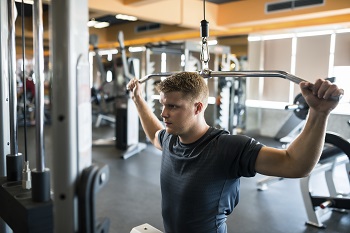 While many students use the summer to relax after a long school year, the months off give athletes a chance to prepare for the upcoming seasons.
While many students use the summer to relax after a long school year, the months off give athletes a chance to prepare for the upcoming seasons.
"There are three basic exercises that can accommodate people of all skill levels," said Jeannine Hurst, coordinator at the McLaren Macomb Athletic Medicine Institute, "and they are simple to perform, require minimal equipment and can provide valuable information for all athletes."
Single-leg Squat
Poor performance indicates: Weakness in the quadriceps leg muscles and glutes (the body's largest and most powerful muscle groups).
Movement:
Begin in a standing position in front of a chair.
Raise on leg off ground in front of you and lower yourself, bending the knee, into a squatting position so you gently touch the chair. Repeat multiple times. Repeat for other leg.
Make sure to maintain your balance throughout and do not let your knee go past your toes. Keep toes, knees, and hips in-line.
"Stork" Test
Poor performance indicates: Lack of balance can lead to increased risk of injury.
Movement:
Remove shoes and place hands on hips. Raise one leg and place the bottom that foot is on the inside of the supporting leg's knee and other knee is pointing out. Then raise the heel of the supporting leg so all weight is on the ball of your foot.
Start a timer. Should be able to hold pose for 40 seconds.
Stop the timer if:
Hands come off hips.
Supporting foot swivels or hops in any direction.
Non-supporting foot loses contact with knee.
Heel of the supporting foot contacts the floor.
Hand-eye Coordination
Poor performance indicates: A lack of hand-eye coordination can greatly affect timing and reaction speed during play.
Movement:
Stand three feet away from a smooth wall. With a tennis ball, throw it with your right hand and catch it with your left. Then throw with your left hand and catch it with your right. Repeat as fast as possible for 30 seconds.
Measurement:
Counting the number of catches
35+ "“ excellent
30-35 "“ above average
25-29 "“ average
20-24 "“ below average
Less than 20 "“ poor
To learn more about the McLaren Macomb Athletic Medicine Institute, visit mclaren.org/ami